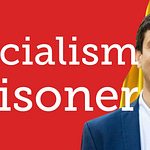In this Institute of Economic Affairs podcast, Executive Director Tom Clougherty interviews Lord Jim O'Neill, former Chief Economist at Goldman Sachs and the economist who coined the term "BRICS." The conversation covers Britain's decade-long economic stagnation, examining whether the 2008 financial crisis exposed deep-seated problems or created new ones. O'Neill discusses his work on regional inequality and the Northern Powerhouse initiative, explaining why cities like Manchester, Leeds, and Liverpool fail to demonstrate the productivity gains seen in other countries' major urban centres.
O'Neill shares insights from his time developing the Northern Powerhouse concept, highlighting Greater Manchester's recent productivity improvements and his belief that "not enough people at Goldman go on the tube." The discussion explores how centralized decision-making from Whitehall has coincided with geographic inequality, and why local authorities need real powers over skills policy and transport. O'Neill advocates for an "Elizabeth line for the North" that could create a single labor market of 9 million people, potentially rivaling London's economic impact.
The interview concludes with O'Neill's views on global governance, discussing how the BRICS vs G7 standoff has created dysfunction in international cooperation. He argues that "leaders are good at creating additional things, but they're not very good at getting rid of them," and suggests that financial markets may eventually force the UK to undertake serious reforms on welfare, housing, and planning. Despite the challenges, O'Neill remains cautiously optimistic about emerging signs of change in both regional productivity and housing market dynamics.











